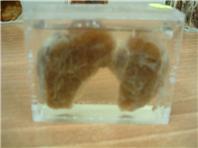The article does not mention thyroid but non the less relevant to some.
Could it be something so simple that will provide the answer?
May 13, 2013 -- MSU News Service
BOZEMAN – Scientists at Montana State University have developed a therapeutic that has potential as a biological drug or probiotic food product to combat many of the more than 80 autoimmune disorders that affect some 23.5 million people in the United States.
A patent application is pending and the technology is available for licensing.
The bacterium used by MSU researchers to develop the new therapeutic is a common organism found in the human gut and could be administered as a probiotic food such as yogurt, as well as in a pill or nasal mist.
Because the therapeutic is engineered into a bacterium that qualifies under the U.S. Food and Drug Administration’s Generally Regarded As Safe designation, it has the potential for low manufacturing costs.
The technology offers potential as a treatment for a wide range of autoimmune diseases, including common and potentially debilitating ailments such as rheumatoid arthritis, Type-1 diabetes, colitis and multiple sclerosis. It could also enhance existing autoimmune treatments.
While the bacterium acts to suppress a broad range of autoimmune responses, it does so without the need for a specific disease antigen to be engineered into compound so that a single therapeutic drug or probiotic could be developed to address multiple autoimmune diseases. Immune response to the therapeutic is low such that it can be administered repeatedly without the body reacting negatively to it.
Currently, MSU has 213 licenses from technologies developed by faculty and researchers. Of those, 85 licenses are with Montana companies.
Contact: Nick Zelver, associate director, MSU Office of Technology Transfer, (406) 994-7706 or nzelver@montana.edu.
PICTURE OF A GRAVES THYROID

